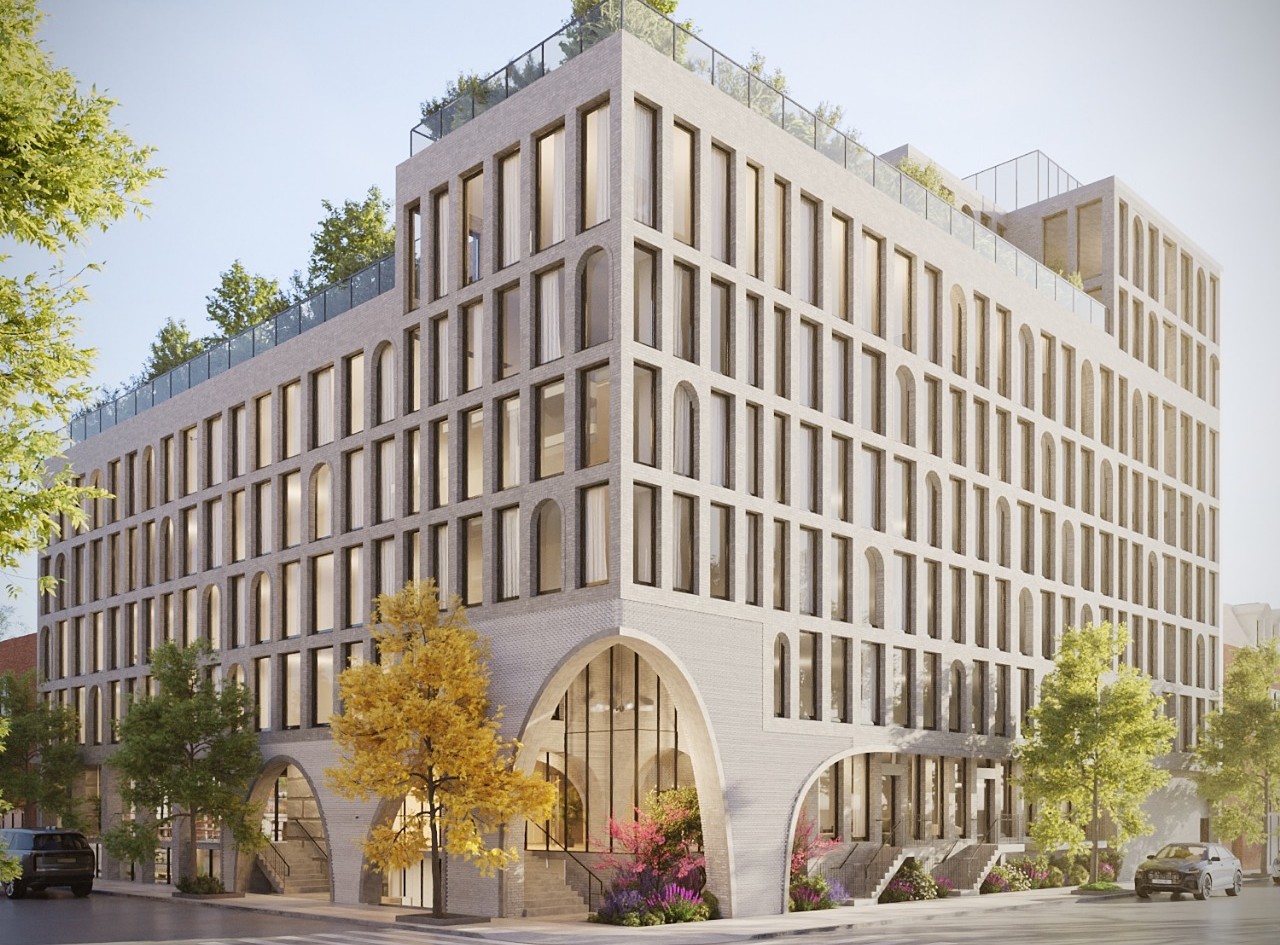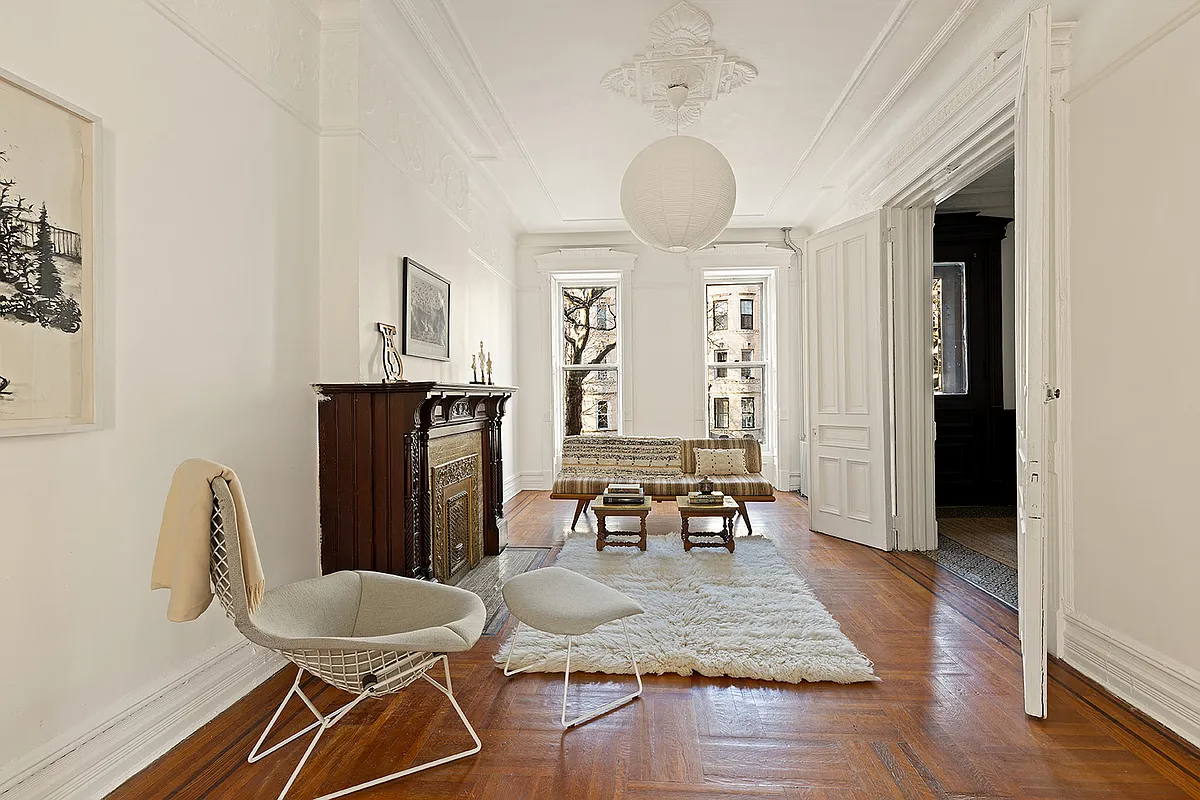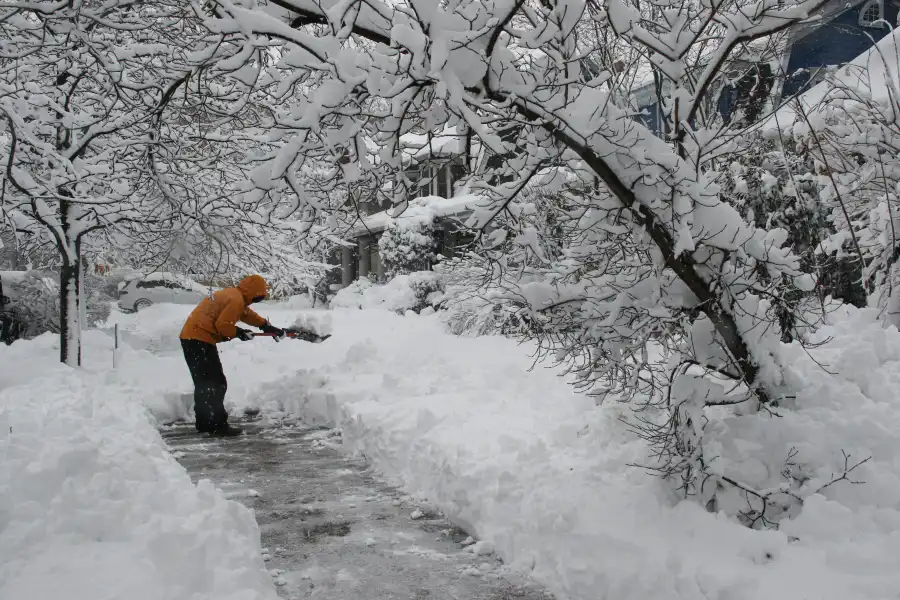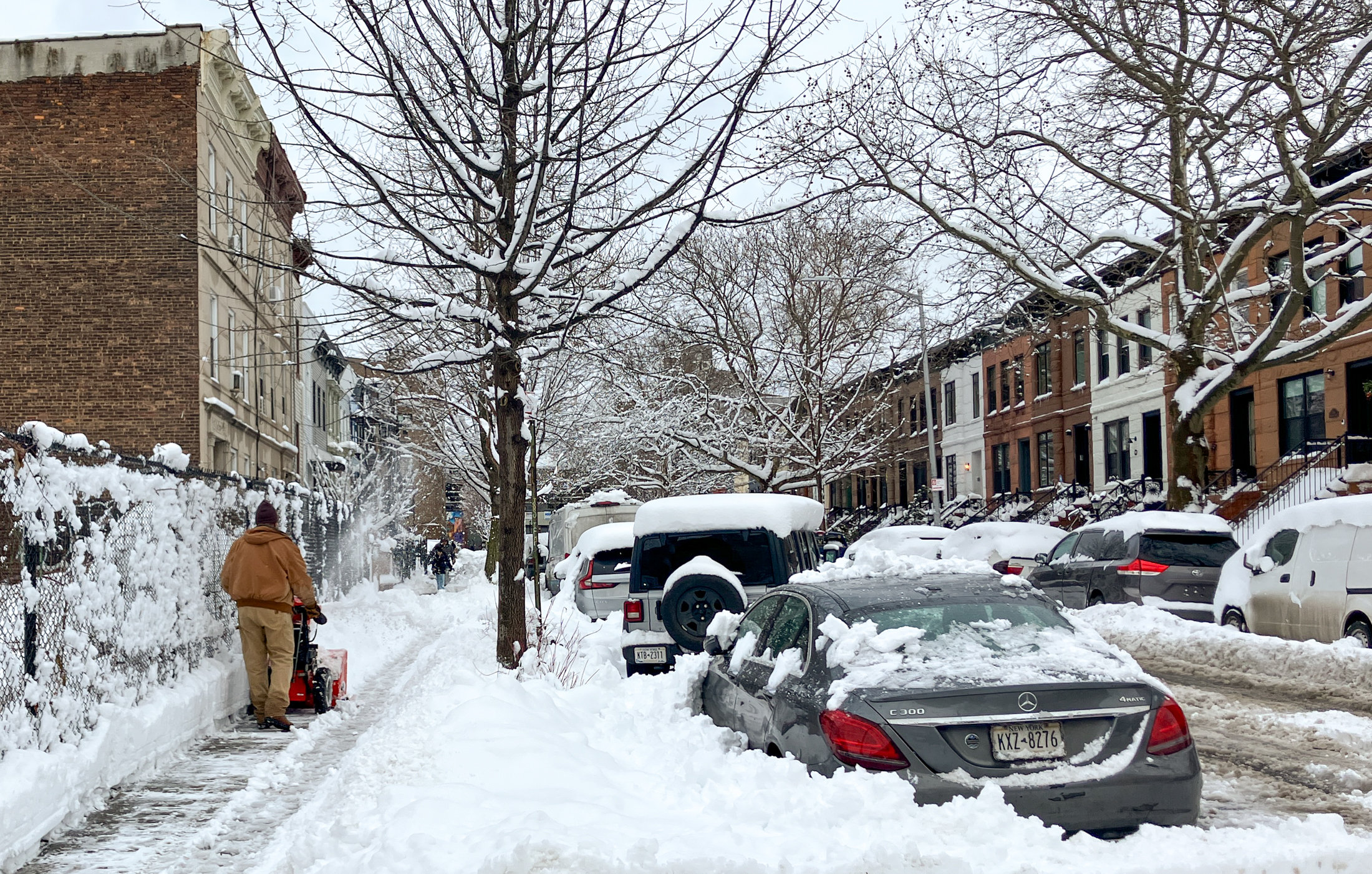John Catsimatidis: Tough Guy For Tough Times
John Catsimatidis: Self-made billionaire; owner of the Gristedes supermarket chain; developer of a planned, 660-unit project on Myrtle Avenue; potential mayoral candidate who says only he is tough enough to carry this city through the tough times ahead. In an interview with Brownstoner at his modest office in Hell’s Kitchen (not the trendy part), he…


John Catsimatidis: Self-made billionaire; owner of the Gristedes supermarket chain; developer of a planned, 660-unit project on Myrtle Avenue; potential mayoral candidate who says only he is tough enough to carry this city through the tough times ahead. In an interview with Brownstoner at his modest office in Hell’s Kitchen (not the trendy part), he describes a bleak future for Brooklyn and beyond. He’s not even positive the first phase of his Myrtle Avenue project is a “slam-dunk” because he hasn’t closed on the loan and “the banks are being a little more onerous than they used to be.” But Catsimatidis says the foundation was poured just in time for the 100 units to fall under the old 421-a rules that give him a tax breaks without providing any affordable units. Families United for Racial and Economic Equality (FUREE) just happens to be planning a protest outside his development site today, furious he reneged on his pledge to build 215 below-market apartments there. The group will also release a report on the displacement of residents and businesses as a result of the Downtown Brooklyn rezoning. Catsimatidis responds to our question about displacement: “There’s no displacement of residents that I know of. There’s no residential buildings that are really being torn down that I know of, and it’s just like I said, people have to stay where they are during a possible recession period.” We’ll find out in the coming months if he plans to officially throw his hat in the ring. Click through to read the interview, edited for length.
Brownstoner: You’ve eliminated the affordable housing component for your Myrtle Avenue project, which is [planned at] 660 units total. What do you think that means for other projects that would be seeking bonds?
It’s not true that we eliminated it forever. The first building we’re building, there’s not an affordable component. They didn’t have any municipal bonds to give us. For the affordable deal, they promised in the future that they think they’ll have some bonds available in 2009. So as we’re building, if we’re building, depending on the sanity of the real estate market in 2009, and if there are bonds available, and the bond market is open to buy these bonds, then we will consider building some affordable units in those buildings.
Looking forward today, the insanity going on in the mortgage market and what’s going on with Fannie Mae and Freddie Mac, they’re sold off 50 percent — I’m not terribly optimistic that the real estate market will come back next year. The building that we are building now, we wanted to continue to do something so it’s not just a vacant lot, and to provide essential services for the neighborhood like the Duane Reade that we’re contracted for. And the supermarket may be one of ours, it may not be one of ours. And one of the banks that were dealing with has agreed to provide a construction loan, which we haven’t closed on yet. But we did get the foundation in on time to meet the June 30 deadline for the 421-a tax abatement (under the old 421-a rules, developers could receive tax abatements without including affordable housing in their projects, unless they were building in certain Manhattan neighborhoods. As of June 30, the area where affordable housing is required has been greatly expanded, and includes Downtown Brooklyn).
Vince Tabone, Red Apple Group senior counsel: This project would not be viable but for the old 421-a. As it is, it’s only because of his economic wherewithal — he’s fronting the financing for the first phase while we’re negotiating with the bank so that we could have made that deadline.
You said you haven’t closed on the construction loan. Does that mean it’s not certain you’re going to move forward?
We’ve negotiated, and the banks are being a little more onerous than they used to be, but we feel it’s probably going to close. But it’s not a slam-dunk.
How much money in bond financing were you seeking per unit?
Lets call it 100 just to multiply it easily. 100 units, $25 million, it’s $250,000 per unit (total, or $1.25 million in bond financing per affordable unit that would have been created).
How do you think that the construction of all this new luxury or market-rate housing in Downtown Brooklyn impacts the lower- and middle-income residents?
First of all, market rate has a dual meaning. It is market rate as far as something you’re buying in Brooklyn. But it’s half price from Manhattan. So, I would almost consider it affordable- to middle-class housing at that market-rate. Even if we decided to sell them as condos, you’d be selling them at $600 [per square foot], $700 bucks maybe, versus Manhattan, which is anywhere from $1,200 to $1,500 a square foot. So, I would almost put it in the category of affordable, middle-class housing.
To people in Manhattan. But it’s not affordable to a lot of the people who are living in that neighborhood right now. Would you agree?
Then we might as well build nothing because we couldn’t build nothing. For whom do the bells toll? Think about it. I mean, should the taxpayers dish out money for affordable housing? Okay they’re willing to, but they ran out of the bonds.
So, you’re saying that without the subsidies housing can’t be built that is affordable to people living [in that neighborhood right now].
But then they’re already living there. If you want to bring in more people at those rates, then probably not. Where would you bring them in from, if they already have homes?
What about wages then? What could be done at the other end so more people could afford these houses?
Well, as of right now that’s not my department as far as wages … I worked at the Chamber of Commerce for 12 years at the West Side of Manhattan when the West Side of Manhattan was going through a revitalization. And the one thing I learned was, if business is doing well, people in the community are doing well. And if you want to kill businesses then people are not going to do well either, because there are not going to be the jobs.
Do you think prices are dropping because people have to put a higher percent down on their mortgage or because people are losing their jobs?
It’s a combination of both. I think a year ago, if we’re selling condominiums for $600,000, you go to the bank and borrow $550,000 and everybody would say, Okay, I’ll put $50,000 down on a down payment, my condo will be worth $800,000 a year from now,” and everybody has a good time. Now the banks are requiring the old-fashioned mortgages and not everybody has $120,000 to $140,000 for a down payment, so that’s one factor.
The other factor is, there’s a fear coming across Wall Street with the financial institutions, with the banks, Wachovia, all the investment bankers. There’s no deals being done. When there’s no deals being done, the next thing that happens after no deals is layoffs. That shoe has not dropped yet but the people working for these firms know that that shoe is about to drop because … that financial market is not going to turn around in 60 days.
So, is there a solution on the city level that can help ease us through this transition?
What’s going to happen is, people are going to [batten] down the hatches. And if you’re living in a rent-stabilized, rent-controlled apartment, you’re not necessarily going to decide to move to a larger apartment that might be market-rate right now.
For a while there was a lot of movement, and theoretically there will be more in the future. As the city continues to redevelop itself, do you think there’s something the city could be doing better to reduce the displacement of residents [and businesses] as it reshapes itself? Brooklyn in particular we’ll talk about.
There’s no displacement of residents that I know of [Downtown]. There’s no residential buildings that are really being torn down that I know of, and it’s just like I said, people have to stay where they are during a possible recession period
… When I grew up on 135th Street, my father was paying $48 a month rent. My father was a waiter and a bus boy. He wasn’t about to move into a $1,000 a month apartment just because he didn’t like living on 135th Street. I don’t know of any apartment buildings of great degree — maybe one, two, three, a small degree — that were torn down. And sometimes those people are paid large monies to displace themselves … But we’ve never torn down residential buildings.
… I went to Brooklyn Tech High School. I remember Dekalb Avenue, I remember Fort Greene Park was a combat zone. We never walked alone on those streets, we always had at least six guys with us. So, I remember those neighborhoods. I remember Myrtle Avenue when I first bought it 25 years ago.
Why did you buy it 25 years ago if it was a war zone?
It was a war zone. Because Long Island University was selling it. I looked at is as an opportunity to buy three city blocks for $400,000 or $500,000.
Now there’s a lot of new construction underway in Brooklyn, and of course across the city but again we’ll stick to Brooklyn. And the economy right now — the lending practices are tighter, the economy is beginning to sour. Do you think there are certain neighborhoods in danger of having a lot of uninhabited apartments, or half-built projects, or vacant lots where there was supposed to be something built, like in so many other cities across the country?
In Buffalo, I understand there’s 20,000 vacant homes.
Right. So, do you think that’s going to happen to places in Brooklyn?
Like I said, New York City is the greatest city in the world. And I think there’s a possibly of prices coming down to meet the needs of the people. And when the banks stop lending and I want to sell a house, there’s such a thing as seller financing. When the seller owns his house he can take a small down payment from the buyer and give him back a purchase-money mortgage (a loan provided by the seller as opposed to a bank, often given when the buyer is unqualified for a commercial mortgage).
And then in terms of jobs that would fill those buildings with people?
If you have less construction — and I think it was a terrible time for the city to have 421 go away — because if you have less construction, all those people who have been working construction jobs because the city’s been booming the last two, three years, you’re going to have a lot less work around.
Well, do you think that those construction workers are the people who are going to be filling these new apartments in Brooklyn?
Not necessarily.
When do you plan to formally announce you’re going to run for mayor, if you’re going to run for mayor?
We’re certainly looking at it very carefully and we’re thinking of forming an exploratory committee over the next month or two.
Did you change your party affiliation from Democrat to Republican already?
Yes.
And why did you do that?
Because I’m a moderate businessman. I believe business has to do well for people to do well. And a moderate businessman, the Democratic Party hasn’t nominated a moderate businessman in over 100 years … And I think when things are tough, you need somebody tough to manage the city.
What makes you tough?
40 years of surviving in business.





Google News didn’t turn up a single article indicating there was any sort of chance that rent regulation was going to be expanded. Please post a link.
Excellent interview. JC seems like a straight shooting business man.
The housing shortage in NYC is due to three main factors:
1) rent stabilization effectively removes 1/2 of the city’s rental housing from the market
2) land and construction costs are too high in NYC to justify building rentals
3) the “threat” of expanded rent regulations in this city is real. do a google news search. most democratic reps in NYC favor EXPANSION of the current rent laws and are pushing it hard. They’re trying to get local control of the Rent Guidelines Board so they can take every last property right away from private landlords. It’s vote pandering on a massive scale and it’s a HUGE fear of landlords and developers.
almost forgot –
fake what sighting.
I confess that I like a little nastiness on this site.
I would never vote for this guy.
wow. that was very unimpressive.
as an aside, if he’s really so cash rich, he needs new counsel and/or banks b/c big developers with cash flow are getting their financing in nyc.
sometimes the bull—- can be unbearable….John Catsimatidis is a blowhard billionaire who’s trying to make money. In this day and age social services are all we should be concentrating on and the one thing this man (and the rest) are trying to avoid. You can’t really, honestly, be OK with him? Self made man or not, he has a responsibility to the community (both the rich and poor parts of it) just like the rest of us.
gotta agree with 11217 on his 5.40 comment.
Well I’ll agree with you on the renters not getting any help. I think at the very least credit card interest should be made deductible again, and then on top of the statndard deduction so that it helps those who can’t itemize.
As far as I know the mortgage interest deduction is not widely found in other countries.
Brine, I’m getting from you that the mortgage interest deduction is a handout to be factored into the equation, but sub-market rents in housing projects should not be included? You quote HUD, but how much does (e.g.) NYC effectively handout each year in reduced rents? I’ve seen rent figures of 300 or 400 quoted on this board. No-one is denying that these subsidized rents are necessary to keep people in places they know as homes, to prevent the city from becoming a monoculture. But leaving them out of the equation you posed is disingenous.